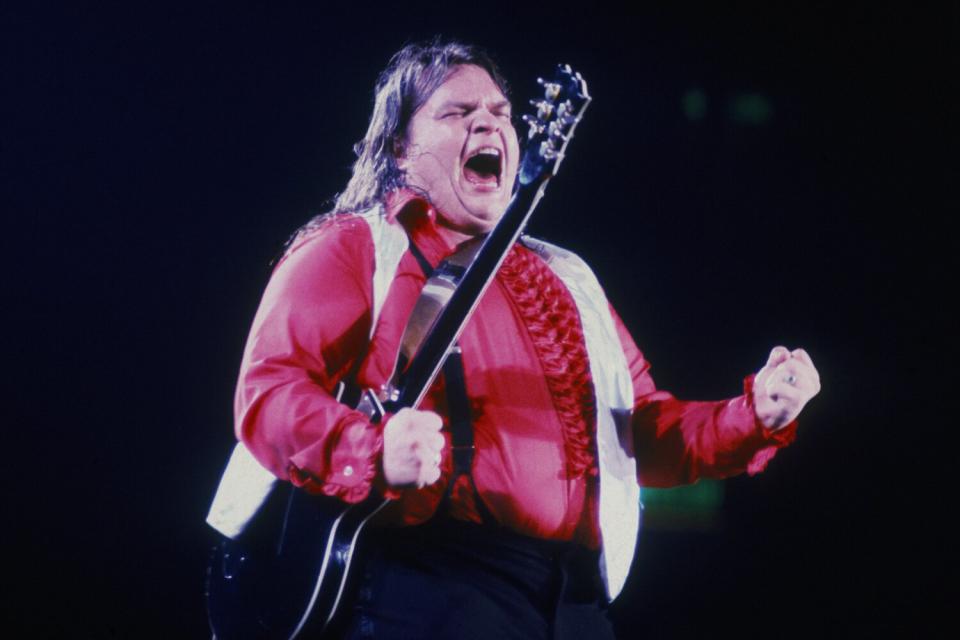Inside Meat Loaf's Health Troubles, Including Vocal Strain, Alcoholism and Onstage Collapses
When Meat Loaf died on Thursday at the age of 74, it marked the final note of a decades-long career filled with spellbinding highs and several setbacks, many of which were health-related.
The "Two Out of Three Ain't Bad" singer, who died with his wife Deborah and daughters Pearl and Amanda by his side, broke through in 1977 with his debut album Bat Out of Hell — but issues with his "strained" voice nearly derailed his success very early on.
"I didn't know how to deal with what was going on around me," he told PEOPLE in 1993 of stepping away from the spotlight a year after the album was released. "For about five years I couldn't work. I didn't want the responsibility anymore."
Struggling with mental health issues, Meat Loaf said he turned to alcohol for nearly a year amid an emotional breakdown, only recovering thanks to psychotherapy (four sessions a week for a year) and the support of his then-wife Leslie.
His highly theatrical, energetic performances also put a strain on his health — in the 1970s, he shattered his leg after leaping off stage, and he collapsed three times while performing in the 2000s.
The first time came in 2003 during a show in London, after which he was diagnosed with Wolff-Parkinson-White Syndrome, he told Rolling Stone at the time.

TED ALJIBE/AFP via Getty Images
"Many people are born with this condition and can live their whole lives without ever knowing it is there," he said in a statement at the time. "Mine appeared to have been quiet until now. The prognosis is excellent as the procedure's success rate is over 95 percent."
Meat Loaf underwent heart surgery at the time to treat the condition, which affects the coordinated movement of electrical signals through the heart, leading to an abnormally fast heartbeat and other arrhythmia, according to the National Institutes of Health.

Alan Singer/NBCU Photo Bank/NBCUniversal via Getty Meat Loaf
Then in 2011, he collapsed on stage while performing in Pittsburgh, telling the crowd, "I have asthma, I can't breathe," according to a local CBS report. He was ultimately able to continue with the show after seeking medical treatment.
The Grammy winner collapsed once more during a performance in Canada in 2016, which he later attributed to "severe dehydration."
"It was nothing but dehydration," he said on Today. "It shocked me that it went around the world like that. I'm going, 'There's a lot more news in the world than me' … I'm fine."
He later noted in the same interview that he'd undergone knee surgery, which was preventing him from putting on the high-energy shows he was used to performing.

Keystone/Hulton Archive/Getty Images Meat Loaf in 1977
Three years later, in May 2019, Meat Loaf suffered another setback after he fell off a stage while preparing to speak at a question-and-answer panel at a horror convention held in a Dallas hotel.
He suffered injuries to his neck, collarbone and shoulder, and was hospitalized for 42 days, according to a lawsuit he later filed against the hotel and the event organizers.
RELATED: Singer Meat Loaf Is Suing Hyatt Regency, Claiming Fall from Stage Left Him Hospitalized for 42 Days
Upon leaving the hospital, the rocker took part in physical therapy, something he was still doing — and which was going "really well" — until the pandemic threw a wrench in things.
"I had eight shows booked in the U.K., and I felt really strong about being able to do them," he told the Pittsburgh Post-Gazette in August. "COVID hit. I lost my PT, and all this strength in my back muscles just left, and I was worse off than before."
Meat Loaf said that he tried to maintain his physical therapy routine with a treadmill, recumbent bike, free weights and a stress machine, but "COVID put me back to zero."
"I was in the gym for 2½ hours on days off, and these guys would walk in, they were fit-looking, I could beat them on any machine they wanted, but that wasn't the goal. The goal was just to stay fit and be able to do my show," he said. "My whole life was spent in football and then in shows and gyms, and when you've done something and then stop it, you deteriorate that much faster."

 Yahoo Movies
Yahoo Movies 
